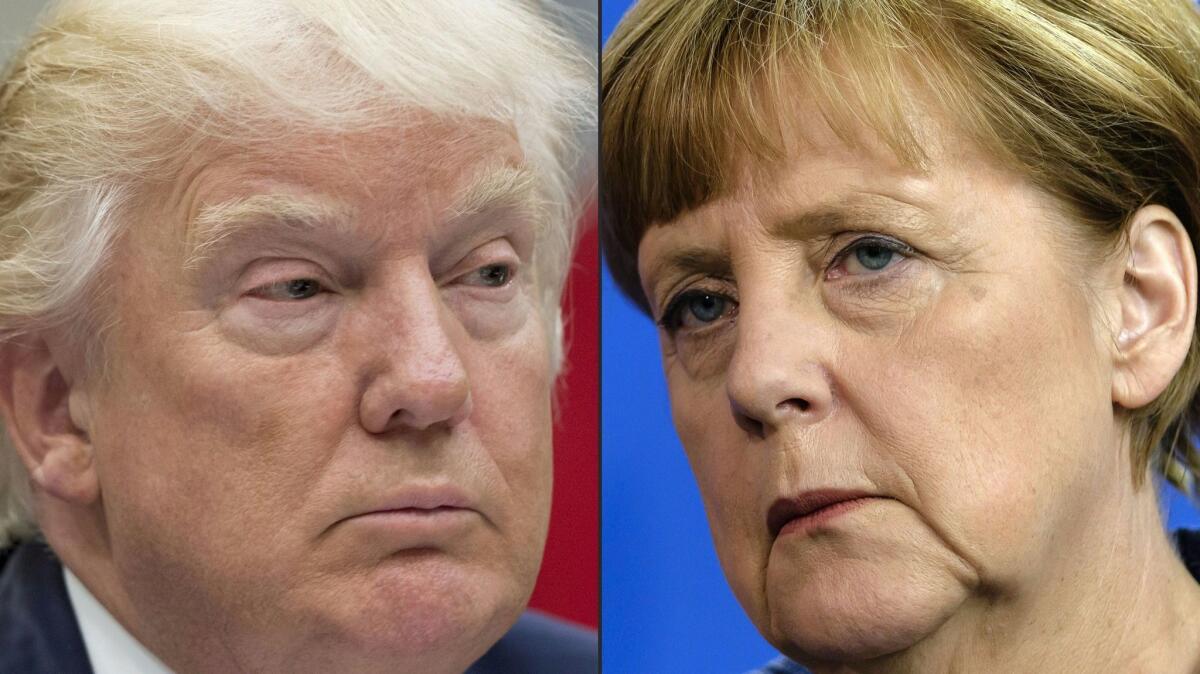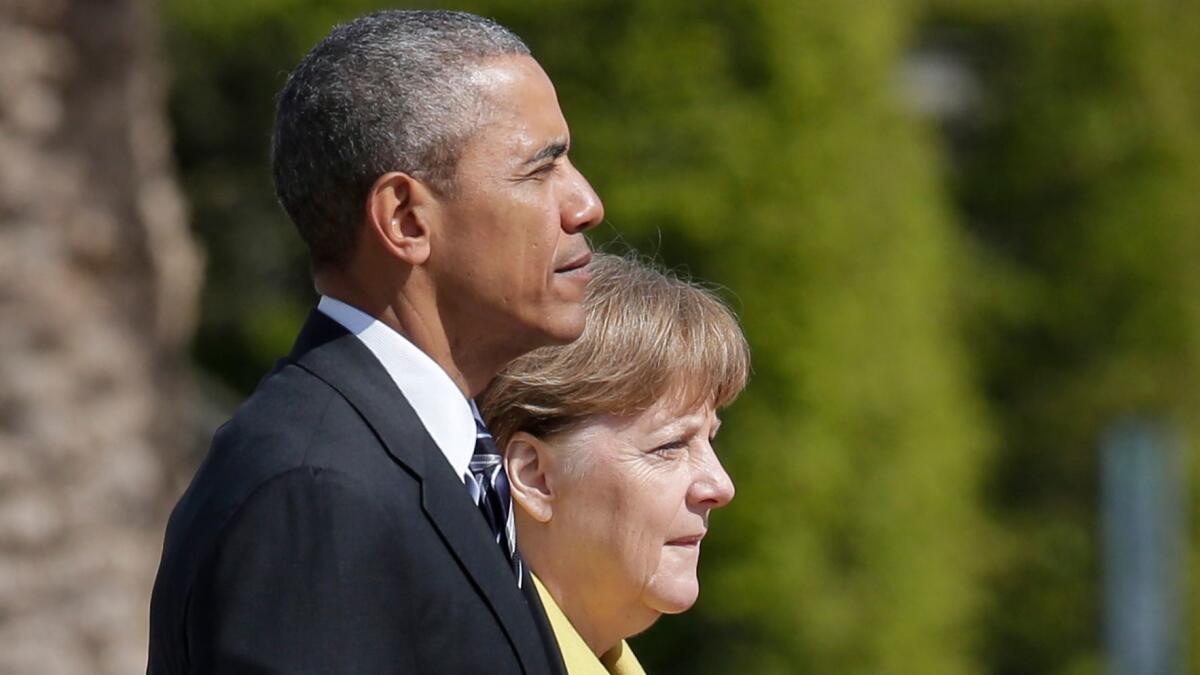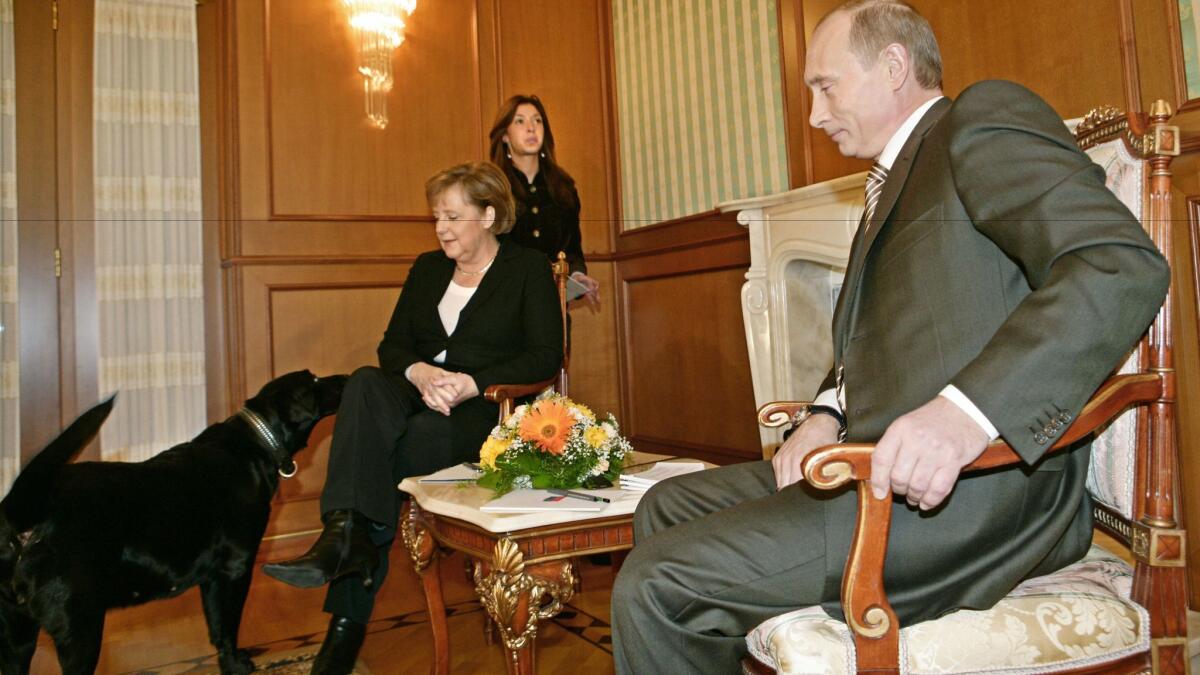After a rocky start, Trump and Merkel are set to meet. Can they overcome their differences?

Reporting from BERLIN — When President Trump and German Chancellor Angela Merkel sit down at the White House on Tuesday, it will be a meeting of two leaders who could hardly be more different — and whose political relationship got off to a decidedly rocky start.
Where Trump is brash and unorthodox, Merkel is understated, even dour, and predictable. Trump was raised amid wealth and glitz; Merkel grew up in the gray world of Communist East Germany.
Trump has repeatedly criticized Merkel for allowing more than a million refugees into Germany over the last two years, has cast aspersions on NATO and has raised the specter of trade wars — a scary proposition for Germany, which relies on exports for half of its gross domestic product.
Merkel, for her part, offered a decidedly backhanded congratulations to Trump for his election victory in November with a moralizing reminder of democratic values.
Still, analysts, diplomats and her political allies in Germany believe Merkel can and will do all she can to work closely and harmoniously with Trump — her third U.S. president. Their meeting has the potential to be one of the most important of the year for both leaders, with much at stake for transatlantic relations and international trade.
Merkel has an impressive track record of developing pragmatic working relationships with a long line of difficult men, notably including Russia’s Vladimir Putin and Turkey’s Recep Tayyip Erdogan. She helped forge a peace treaty in Ukraine with the former and created a plan to slow the flood of Syrian refugees into Europe with the latter.
Her serenity has always been the ace up her sleeve. She’s figured out a way to work with pretty much everyone.
— Thorsten Hasche, a political scientist at Goettingen University
Merkel got along well with George W. Bush, even though he was enormously disliked across Germany. Merkel even figured out how to get her way with former Italian Prime Minister Silvio Berlusconi, who, like many men before him, made the mistake of underestimating her.
“She has seen European leaders come and go — very charismatic, very dynamic, very boisterous leaders,” Heather Conley, director of the Europe program at the Center for Strategic and International Studies in Washington, said during a conference call Friday. “She has this history and this approach to leaders [who] may be in fact very unpredictable.” Conley added that it was vital for Trump and Merkel to get the relationship right.
“While personal chemistry isn’t the be-all, end-all, it is important. It sets the tone,” she said. “She’s doing the right thing by coming.”

A trained physicist with a doctorate and a pastor’s daughter, Merkel also got off on the wrong foot with President Obama by nixing the then-presidential candidate’s plans to speak at the Brandenburg Gate just four months before the 2008 presidential election, forcing him to speak in front of a lesser backdrop two miles away from the heart of Berlin. Their relationship was later set back by the revelation in 2013 that the United States had been monitoring her cellphone.
Nevertheless, they eventually became such close allies that Obama told Germans in November he would vote for Merkel if he could.
“There’s no point trying to ram your head through the wall — because at the end of the day the wall is always going to win,” is one of the 62-year-old Merkel’s favorite sayings when she wants to describe the futility of pointless battles.
“Her serenity has always been the ace up her sleeve,” said Thorsten Hasche, a political scientist at Goettingen University. “She’s figured out a way to work with pretty much everyone.”
Always a quick study, Merkel has remained popular across party lines in Germany thanks to her steady hand and a dull, unflappable style that’s well suited to a country that has harbored a deep-seated fear of rabble-rousers over the seven decades since the end of its Nazi nightmare. Even after 12 years in power, Merkel is showing no signs of fatigue and remains the odds-on favorite to win a fourth term in an election on Sept. 24.
She bears no grudges and has made it clear that she is interested in forging a alliance with Trump — despite his bashing of her open-door policies on Syrian refugees.
“I’ll be talking about the interests of our countries and will try to identify as much common ground as possible,” Merkel said in her typically prosaic fashion on Friday.
In hopes of finding common language with the career businessman, Merkel will be bringing some of Germany’s top business leaders with her.
According to a report in Der Spiegel news magazine, the chief executives of BMW and Siemens will accompany Merkel to the White House, a not-so-subtle reminder that Siemens employs 70,000 people in the United States and BMW’s largest factory is in South Carolina. Trump’s campaign threat of imposing a 35% import tax on German cars caused widespread fears in Germany, a country whose prosperity is based on its perpetual trade surplus.
“She’ll very much be interested in standing up for the interests of German industry at the meeting with Trump,” said Gero Neugebauer, political scientist at Berlin’s Free University. “The carmakers are especially concerned about what he’s been saying.”
To learn more about Trump, Merkel and her advisors have reportedly been studying his speeches and interviews — even unearthing a cover story on Trump in Playboy magazine in 1990.
Free trade and open markets will be one of the main issues on Merkel’s mind while Trump will want to talk about Germany adhering to a pledge to the North Atlantic Treaty Organization to spend at least 2% of its gross domestic product on defense. Germany’s defense spending rose 8% last year and Merkel has said she plans to raise it from the current 1% of GDP to 2% by 2024.
Merkel will probably remind Trump of the perils of isolationism and that with private companies thriving in global markets because of their high quality and strong competitive position, there is nothing the German government can do to reduce its widening trade surplus, which hit a record of $270 billion in 2016.
Still, she acknowledged in an interview with German journalists recently: “It’s difficult to plan a strategy — with someone like Trump I have to rely on reflexes.”
For his part, Trump will be interested in getting advice from Merkel on how to deal with Putin, U.S. officials said in Washington on Friday. Merkel’s background gives her unusual insight into Putin, who was once a KGB spy in East Germany. Just as Putin speaks German, Merkel speaks Russian, and she intimately understands the world view of someone raised in the Soviet system.
Putin may have also set the bar for what Merkel considers a difficult meeting. When he met with Merkel in Sochi, Russia, in 2007, he brought his black Labrador — despite her fear of dogs that stemmed from once being bitten. Pictures of their meeting show Merkel struggling to remain calm as the dog sniffed around her legs.

“Even though I think the Russian president knew full well that I wasn’t thrilled to meet his dog, he brought him in,” Merkel said in a newspaper interview. “You can see how I gallantly I tried to keep my eyes on Putin rather than the dog.”
Merkel recently joked to a group of journalists that, after that, she was ready for anything.
As luck would have it, Trump is the first canine-free American president since William McKinley (1897-1901). “I’m glad that, as far as I know, he doesn’t have a dog,” Merkel told journalists recently with a laugh.
Kirschbaum is a special correspondent.
ALSO
A plain-spoken German populist may have a shot at ousting Angela Merkel
French conservatives, lacking a ‘Plan B,’ reel as Fillon’s presidential campaign seems to implode
Tensions across Asia present challenges to secretary of State’s first visit
More to Read
Sign up for Essential California
The most important California stories and recommendations in your inbox every morning.
You may occasionally receive promotional content from the Los Angeles Times.









